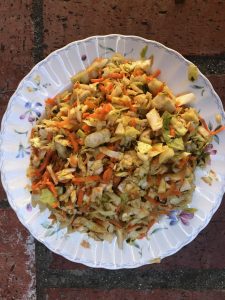Cooking my way through Joudie Kalla’s Baladi cookbook, I found myself hooked on the least likeliest of recipes: cabbage salad.
The Arabic name is also the description: Salatet malfouf bil toum wa na’na’ , or Cabbage Salad with Cumin and Mint. There’s not much more too it, just olive oil, lemon juice, salt and pepper. You shred the vegetables, add the other ingredients, scrunch them up to soften and blend, and that’s it. The fragrance and flavors are powerful, transporting. And it’s just cabbage.

Cabbage, mint and cumin salad
I brought a massive bowl to a Hanukkah potluck. The hostess texted me the next day. “I need the recipe for that Persian salad,” she wrote.
No problem, I texted back, except it’s not Persian, it’s Palestinian.
Understandable, right? “Palestinian” is just not a category in our food consciousness. Israeli food is the rage, thanks to Yotam Ottolenghi, Sami Tamimi, Alon Shaya and Michael Solomonov (and their under-sung predecessor Erez Komorovsky). And none of these chefs would deny or obscure the fact that their ingredients and inspirations often come from Palestinian kitchens. But because their dishes are filtered through an Israeli or American sensibility and nationality, the label “Israeli” sticks. They are the market makers, and the market makers get to decide on marketing.
(I could go off on a tangent here about how history and culture have led Jews to excel at marketing as a survival mechanism, and how that explains, among other things, how hummus could exist as a staple of Middle East culture for thousands of years but not until Israelis began making, promoting and marketing it did it become the peanut butter of the West, identified as “Israeli” though it long pre-exited the Jewish state. Same with Jaffa oranges, which were actually created by Arab agronomists in Ottoman-era Palestine. But those are for other posts.)
Joudie’s books correct the idea that there is an Israeli cuisine – which there is – but no Palestinian cuisine, which there is and has been as well. Baladi roots many ingredients and dishes in the land and culture before Israel came into existence. Nowhere does Joudie Kalla make the argument that Jews didn’t live in the land prior to that, or that there aren’t a myriad of influences on the cuisine – European, Ottoman, her own creativity, etc. All she is saying is this is what Palestinians have been cooking and eating, these are the foods of tradition and, for many Palestinians living outside Israel, of memory.
So the books are a celebration and reaffirmation of Palestinian culture, which can be revelatory to American Jews whose views on Palestinian culture begin and end with intifadas and Arafat.
In my case, I’ve had quite a few meals in Palestinian kitchens, shopped in Palestinian markets, and eaten in Palestinian restaurants, in Israel, the West Bank and abroad. Nope, I’m not saying some of my best friends are Palestinian. I’m saying for all my experience with Palestinian food, I still found the recipes in Baladi a revelation.
Starting with the grape leaf casserole I wrote about yesterday, and including this simple cabbage salad. I can’t wait to try more.